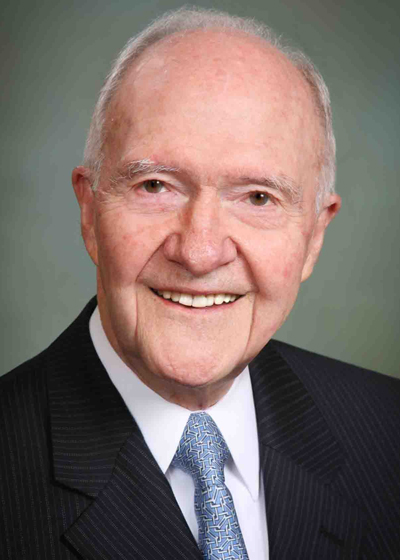
The Scowcroft Institute of International Affairs at the Bush School of Government and Public Service, Texas A&M University, hosted its namesake, Lt. Gen. Brent Scowcroft, USAF (Ret.) on Wednesday, November 13. Scowcroft shared his assessment of the national security issues facing the United States today, which was followed by discussion and questions moderated by Andrew Natsios, director of the Scowcroft Institute, professor at the Bush School, and former USAID administrator.
The program, “An Evening with Brent Scowcroft,” was hosted at the Annenberg Presidential Conference Center, with a reception following General Scowcroft’s remarks.
Scowcroft’s talk focused on the theme of the many new forces in the world that the US has to account for in developing a grand strategy–which leads to the US dealing with problems never dealt with before.
“These new forces are eating away at the [Westphalian] nation-state system. Now, the forces of globalization are working in the opposite direction [of the Cold War era]. More and more of the things people need can only be gotten by compromise, sharing, and agreeing around the world,” Scowcroft said.
He added that the end of the Cold War marked for him a major transformation in the world environment.
“It was a historical discontinuity. The world of the Cold War was a deadly serious world. But it had one redeeming feature: the strategy was a given. The strategy was containment,” Scowcroft said. “We have a new world, and the unifying strategy is no longer there. We tend to use all tactics now because there is no over-right or over-arching goal that makes it easy to plan for the future. That has been exacerbated by changes in the world environment.”
Scowcroft highlighted information technology (IT) as being one of the most important changes in the global environment that the US has to account for in national security.
The general then went on to discuss the current landscape of national security in a globalized world, touching on the US-China relationship, India, North Korea, the Middle East, and Syria.
Students were allowed to submit questions in advance, some of which focused on his time in the Bush Administration while others focused on current national security concerns.
Second-year Master’s Program in International Affairs student Cait Stadler submitted the question, “What is your fondest memory of President Bush?” To this, Scowcroft replied, “I have so many that it’s almost impossible.”
“We used to have informal National Security Council (NSC) meetings. Some of them got pretty vigorous and sometimes heated and so on. When that happened, [President Bush] would intervene and tell a joke. And you could feel the tension leave the room,” Scowcroft said. “To me, that marked him and how he dealt with people. He just inspired loyalty and trust, and he’s just a wonderful man. To me, he was the best prepared president we ever had.”
In an interview after the event, Scowcroft talked about his motivation and offered some advice for Bush School students.
“I don’t think there is anything more rewarding than working for the government–I was always working for something bigger than I was,” he said. “Look for something that is challenging and that will make you eager to go to work every day. This makes you continue to grow—something you are passionate about. That’s what the goal ought to be.”
General Scowcroft is president of The Scowcroft Group and is known as one of the country’s leading experts on international policy. He served as national security advisor for President Gerald Ford and President George H. W. Bush, the only individual in US history appointed to the position under two different presidents.
Named a Distinguished Graduate of West Point, Scowcroft served twenty-nine years in the US Air Force. During his Air Force career, he held several academic and security positions, teaching at both West Point and the Air Force Academy. He later worked in the Department of Defense as special assistant to the director of the Joint Chiefs of Staff and served as military assistant to President Richard Nixon.
In 1991, General Scowcroft received the Presidential Medal of Freedom, the nation’s highest civilian honor, from President George H.W. Bush. He was awarded an honorary knighthood—Knight Commander of the Order of the British Empire (KBE)—by Queen Elizabeth II in 1999; and he was presented the Grand Cross of the Order of Merit of the Federal Republic of Germany in 2009.
In addition to his degree earned at West Point, the general holds master’s and doctorate degrees in international relations from Columbia University.

